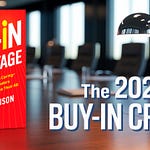Why Your $200K Salary Is Actually Making You Poor (And What to Do About It)
A conversation with Bronson Hill that will change how you think about wealth forever
"Unless you learn how to make money while you sleep, you'll work until you die." — Warren Buffett
At 3 AM, when the world is quiet and your defenses are down, do you ever wonder if you're on the right path?
You're successful by every external measure. Good income. Respected position. Yet something feels off. You're trading time for money, and the math doesn't add up to the freedom you imagined success would bring.
I had this exact conversation with Bronson Hill last week, and it shattered everything I thought I knew about wealth building.
The Medical Sales Professional Who Cracked the Code
Six years ago, Bronson was making over $200,000 a year in medical device sales. By most standards, he had "made it." But he felt trapped in the time-for-money exchange that keeps even high earners stuck.
Today, he's the managing member of Bronson Equity and has personally guided over $50 million in capital for real estate ventures. More importantly, he took 145 days off last year—with his phone completely off.
The transformation didn't happen through some get-rich-quick scheme. It happened through a fundamental shift in understanding what wealth actually means.
The Lie Most People Believe About Passive Income
Here's what Bronson taught me that most people get wrong:
Owning rental properties isn't passive income—it's owning a job.
Think about it. If you're the one getting calls about broken air conditioners, managing tenants, and handling repairs, you haven't created passive income. You've created another business that requires your time and attention.
"The real test," Bronson explained, "is this: Whatever strategy I'm doing, if I couldn't very quickly 10X that strategy without it becoming a job, then I'm not really passive investing."
This distinction changed everything for me. Most of what we call "passive income" is actually just active income disguised with different packaging.
What We Really Want (Hint: It's Not Money)
During our conversation, Bronson made a profound observation: "What we really want is time freedom."
Financial freedom sounds appealing, but what we're actually seeking is the ability to choose how we spend our time. Money is just the vehicle that can provide that choice.
When Bronson talks about his "rat race number"—the minimum monthly cashflow needed to cover his basic living expenses—he's not talking about maintaining a lavish lifestyle. He's talking about buying back his most precious resource: time.
"For me, it was only five or six thousand a month," he shared. "Once I replaced that with recurring revenue, I was free. I could choose if I wanted to go to work or not."
The Psychology Behind Wealth (This Will Surprise You)
Here's where our conversation took an unexpected turn into territory that most financial advice completely ignores.
After interviewing over 2,500 high net worth investors with an average net worth of $2 million, Bronson discovered something remarkable: Almost every single person worth over $10 million has a mindset practice.
"About 90% of people have self-sabotaging behaviors," he explained. "We procrastinate. We have negative self-talk. It's this concept of wealth worthiness—what do I feel I'm worthy of?"
This hit me like a lightning bolt. We can learn all the investment strategies in the world, but if we don't believe we're worthy of wealth, we'll unconsciously sabotage our own success.
Bronson shared his own journey through this: "When I went through my divorce, I literally felt no sense of self-worth. I had to create what I call 'whisperings'—not just affirmations you say in the mirror, but what you say to yourself when you stub your toe and feel like an idiot."
His personal whispering? "I, Bronson, own the room with the confidence and authority of a king."
It took over six months of daily practice, but eventually, those internal messages shifted from self-doubt to self-assurance. And his external results shifted along with them.
Ancient Wisdom for Modern Wealth
What struck me most about Bronson's approach is how it bridges timeless wisdom with contemporary strategy. He regularly references his faith, quotes philosophical principles, and emphasizes the spiritual aspects of wealth building.
"A lot of faith people think business and money isn't spiritual," he told me, "but I actually think it's very spiritual to be in business. It's about inviting God into that process and flowing love and kindness toward others."
This aligns perfectly with what I've discovered in my own journey: the most sustainable success comes from serving others while staying grounded in principles that transcend market cycles and economic trends.
The Framework That Actually Works
Here's Bronson's practical framework for evaluating any investment opportunity:
Start with the market - What does the landscape look like? What are the risks and opportunities?
Evaluate the operators - Who's running this? Have they done it before successfully? Do your values align?
Understand the deal - Can you clearly articulate how you'll make money and what the primary risks are? If you don't see any risks, you don't understand the deal well enough.
"There's always risk in every investment," Bronson emphasized. "The key is going in with eyes wide open."
The Tax Strategy Nobody Talks About
One of the most practical insights from our conversation involves tax strategy. Bronson shared how certain investments can provide immediate tax benefits while generating ongoing returns.
For example, he described oil and gas drilling investments that allow you to reduce your taxable income by 80-90% of your investment amount in the first year, while potentially producing 18-25% annual returns.
"I know one couple—medical professionals who sold their business for $5 million in California. Their tax bill was over $2.3 million. Through tax strategy, they got it down to $100,000."
The key insight? Most CPAs aren't tax strategists. Only about 2-3% of CPAs actually create comprehensive tax strategy plans. Finding the right guidance can literally save you millions.
What This Means for Self-Aware Leaders
As I reflected on this conversation, I realized that Bronson's journey embodies everything we talk about in self-aware leadership:
Self-awareness - He recognized that his corporate success wasn't giving him what he actually wanted (time freedom).
Resilience - He navigated personal challenges (divorce, loss of self-worth) and used them as fuel for growth.
Ancient wisdom - He grounds his approach in spiritual principles and timeless truths about human nature.
Systems thinking - He built processes that work without his constant involvement.
Authentic leadership - He leads from vulnerability and genuine service to others.
Most importantly, he understood that the investment is you, and the money is just a realization of who you are.
The Question That Changes Everything
Near the end of our conversation, Bronson shared something that gave me chills:
"Everything is impossible until you start. If you want to see where your life is going, look at the words you use today. In five years, you will be a product of the words that you use today."
This brings me back to that 3 AM moment I mentioned at the beginning. If you're lying awake wondering if you're on the right path, maybe the question isn't about your strategy.
Maybe the question is about your story.
What story are you telling yourself about what's possible? What story are you telling yourself about what you're worthy of? What story are you telling yourself about money, success, and the kind of life you can create?
Because here's what I've learned from leaders like Bronson: The outer transformation always follows the inner transformation.
Your Next Step
If this resonates with you, I want to invite you to go deeper. Bronson has created a free guide called "The Mailbox Money Blueprint" that outlines his three favorite cashflow investments for 2025.
Text "CASHFLOW" to 33777 to get it.
But more than that, I want to invite you to join our community of self-aware leaders who are building wealth while building character, creating success while creating meaning.
The Self-Aware Leader's Inner Circle is where we have these kinds of conversations regularly—not just about money, but about the mindset, systems, and spiritual principles that create sustainable success.
We're building something special here. A community where you can be honest about your 3 AM questions, where ancient wisdom meets modern strategy, where vulnerability is strength and service is the path to significance.
What resonated most with you from this conversation? Reply to this email—I read every response and often feature insights from our community in future posts.
Until next week,
Jason
P.S. Bronson mentioned something that keeps echoing in my mind: "Words have creative power. I'm very picky about what I say about myself and others. We're going to come from a place of positivity because if you want to create something in your business and life, you've got to do it with your words."
What words are you using to create your future?
Connect with Bronson:













Share this post